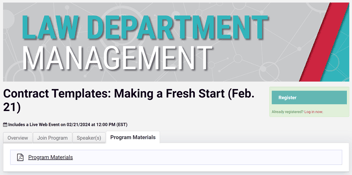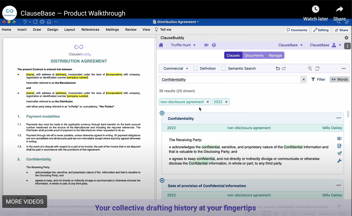 Here's my dark secret: in the past 20 years, I've done little contract drafting.
Here's my dark secret: in the past 20 years, I've done little contract drafting.
I’ve had little reason to—I don't do deals. In my consulting days, occasionally I would help companies with their templates, but those days are long behind me. Instead, in effect I've been in a sourcing department, recommending contract-language building blocks and how to use them.
But that work is largely done. That's why I'm now wearing my Adams Contracts hat, building highly customizable automated templates. Currently I'm finalizing our third template, to create certain kinds of services agreements. (More about that soon.) But that task reminds me that preparing contract templates is no picnic.
Here are the challenges as I see them.
First, if you want to do the copy-and-paste thing, what's out there is an ocean of dysfunction, regardless of the organization responsible. I've collected a mountain of evidence on that score. Good luck finding anything clear, concise, and relevant and recognizing it even if you do; it's easy to feel overwhelmed.
Second, when you're picking over scraps in the traditional-contract-drafting junkyard, it would help if you could understand why a given contract says what it says. But that's often challenging: the dysfunction in contracts is mirrored by the erratic value of much of the commentary.
Third, you're faced with substantive choices every step of the way, and you can address them in more or less detail, depending on the contingencies and the risk, and you can word them all sorts of ways. Decisions, decisions!
Fourth, it's unlikely you're equipped to create a template on your own. You'd probably need the input of a few people with experience doing that kind of deal. And you'd probably benefit from the help of experts in specialized areas, such as intellectual property and insurance. If you aren't an informed consumer of contract language and don't have editor chops, you'd need help there too. Finding that kind of help can be challenging. And it can be challenging knowing whether the people you've found are actually able to help. Or you might not have much choice whom you consult, in which case there's a better-than-even chance you'll find yourself in drafting-by-committee hell.
Fifth, wrangling contract language takes a lot of time, and you probably have a lot of other stuff going on. A week or two ago I saw a LinkedIn post—sorry, I don't have a link—suggesting that of a hypothetical 40-hour workweek, the average in-house lawyer devotes 32 hours to administrative stuff. I assume one can quibble over the details, but I get the idea: it would probably be challenging for many of you to find the time necessary to submerge yourself in template work.
Sixth, if you're of a mind to offer customization, you might face two problematic extremes. On one hand, Word is a clumsy way to capture options—you're limited to using either footnotes or bracketed language. On the other hand, if you go all-in on document-assembly technology but are a dilettante—who, me?—you can expect to find yourself submerged in code, wrangling options upon options upon options.
And seventh, looming over everything is the spectre of inertia. As if the task itself weren't challenging enough, organizations resist change. Noodling over crappy and annoying contract language that hardly anyone understands? The rewards are too uncertain! Training all those people? Fielding inquiries from suspicious customers? No thanks! Instead, let's slap an "excellence" label on it all and be done with it!
That’s why in 2021 I was able to prepare this Word document containing six before-and-after extracts analyzing Salesforce's then master subscription agreement, showing just how poor the drafting was. Salesforce has access to all the resources an organization might need to do the work properly, but it failed. Anecdotal evidence suggests that this is the norm.
And for me, interplay of some of the factors noted above have caused me to drag my heels in working Adams Contracts' new services-agreement template, losing a couple of weeks. That doesn't matter—what's more interested is being reminded that this process is always hard.
(By the way, if you're at the ACC 2024 annual meeting in Nashville next week, drop by the LegalSifter booth and say hi!)


